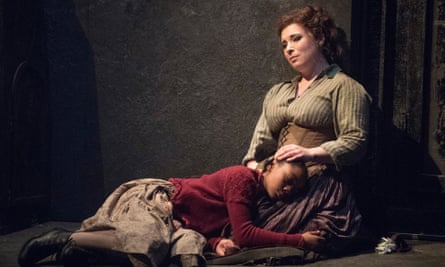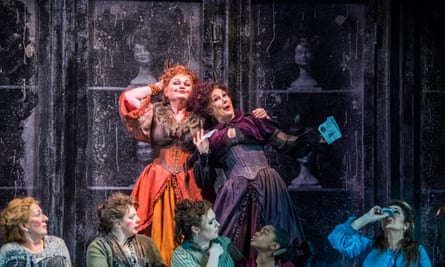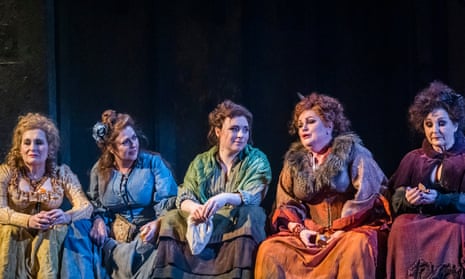As composer Iain Bell and his librettist Emma Jenkins have made clear, it was English National Opera that insisted on adding the sensationalist tag to the publicity for their new opera. Whether adding “Jack the Ripper” to their preferred title, “The Women of Whitechapel”, will attract a bigger audience than it otherwise would have will never be known. But as the famously unidentified murderer never appears in Bell’s opera, which concentrates instead on the lives of his victims and their struggles to survive amid the appalling poverty of east London in the 1880s, the original choice is more accurate.
Not that this is a documentary opera in the manner of John Adams’ Doctor Atomic or his more recent Girls of the Golden West; there is not enough material on the lives of the Ripper’s victims to enable that. In fact little is known about most of them other than their names. What Bell and Jenkins offer instead is a “dramatic reimagining”; an evocation using some of the known facts and embroidering them with invented material in an attempt to find a narrative thread on which to hang an opera that, with a single interval, runs for almost three hours.

It is centred on the last of the known victims, Mary Kelly (sung with tremendous presence and tireless intensity by Natalya Romaniw), whose efforts to prevent her daughter Magpie (a touching performance from Ashirah Foster Notice) from being sold to a vice ring provides a semblance of plot. Against Mary is set the invented character of Maud (Josephine Barstow), the pitiless manager of the doss house in which the women live, who acts as their pimp and abortionist and supplies the Victorian establishment with girls. The Ripper’s atrocities, the opera suggests, are driven by an attitude to women that is different only in its barbarity from that of “respectable” male society.
That’s all laudable and sincere enough, but the best of creative intentions don’t guarantee a convincing, dramatically engaging piece of music theatre.
The narrative is fragile, and apart from the two central characters, everyone else is a cipher, so that the idea of using celebrated ENO singers in the roles of the other victims – Marie McLaughlin, Janis Kelly, Susan Bullock and Lesley Garrett – as well as Alan Opie as the pathologist and Robert Hayward as the police commissioner, is rather wasted. Bullock, as Elizabeth Stride, has a drunk scene with Nicky Spence’s constable, but it seems contrived, a rather desperate attempt at introducing a lighter note into what is inevitably a grim chronicle.

Bell’s score is expertly conducted by Martyn Brabbins; it is accomplished enough without being at all memorable. Most of it could have been composed at any time in the last 60 years – Britten’s Peter Grimes is the most obvious reference point – but there is never any sense of the music driving the drama, or of the theatrical effectiveness of the work being enhanced by either the setting of the text or the accompaniment. There is also far too much of it: at least 30 minutes’ music could painlessly be cut, and that might tighten the drama, too, and make the closing scene less ludicrously protracted.
Daniel Kramer’s production, with designs by Soutra Gilmore, is unremarkable, and occasionally rather clumsy, but there is, one suspects, little he could have done to make The Women of Whitechapel live more vividly on stage.

Comments (…)
Sign in or create your Guardian account to join the discussion